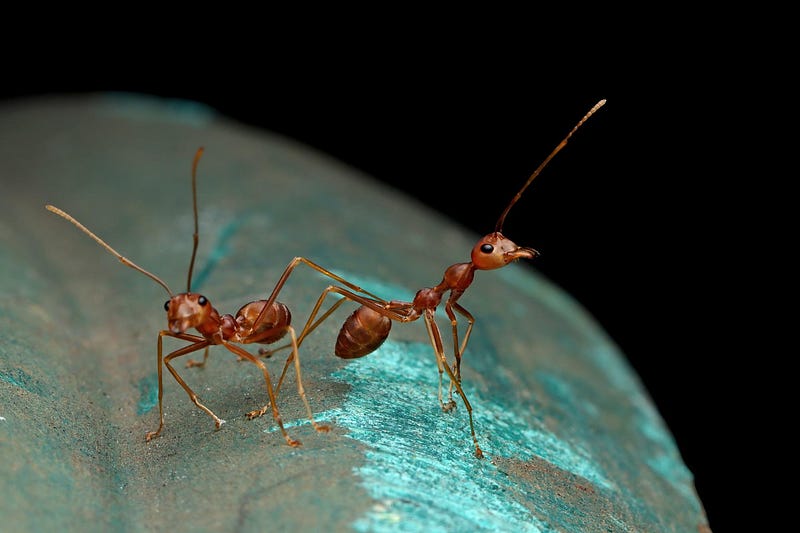Innovative Ants: A Breakthrough in Cancer Detection
Written on
Chapter 1: Ants and Their Remarkable Smell Detection
Recent research has revealed that ants possess an extraordinary ability to detect cancerous tumors through their sense of smell, despite lacking nostrils. A study published in the Proceedings of the Royal Society B outlines how scientists have trained ants to recognize cancer by sensing specific chemicals, known as volatile organic compounds, found in bodily fluids like urine.
Cancer remains a leading cause of death globally, with over 19 million cases and approximately 10 million fatalities reported in 2020. This innovative study hints at the potential for ants to serve as a low-cost, non-invasive method for cancer detection in the future. Biomedical engineer Debajit Saha emphasized this technique as a “new and very powerful approach to disease detection” in a conversation with Scientific American.
The lead author of the study, Baptiste Piqueret, along with his team, successfully conditioned ants to connect the scent of cancer with a reward after only three sets of 10-minute training sessions. This rapid training process is significantly quicker than that required for dogs trained to detect cancer, which can take six months or more.
However, additional research is essential to understand the effects of factors such as age, sex, and diet on detection capabilities, and to explore whether smaller tumors can be identified. In practical applications, ants would only analyze urine samples in a controlled laboratory environment rather than directly assessing patients.
The advantages of utilizing ants for cancer detection are substantial. This method not only promises a faster turnaround than traditional techniques, but it also reduces costs and invasiveness, thereby making early cancer detection more accessible to a broader audience.

Section 1.1: The Potential of Ants in Cancer Detection
The findings of this study highlight ants’ remarkable olfactory capabilities, which allow them to detect even the smallest variations in chemical compositions present in bodily fluids. This discovery could lead to significant advancements in cancer detection methodologies, making them more accurate, efficient, and cost-effective.
The study's authors are committed to expanding their research, aiming to incorporate urine samples from human subjects diagnosed with specific cancers. With further investigation, the vision of an ant-powered tool for early cancer detection may soon become a reality, offering hope to millions across the globe.
Section 1.2: Interdisciplinary Collaboration and Future Prospects
The application of ants in cancer detection paves the way for exciting interdisciplinary collaborations among biology, engineering, and medical fields. This is a thrilling time for scientists focused on creating innovative strategies for cancer detection and treatment.
As the global community continues to grapple with the severe consequences of cancer, any novel discovery that promotes earlier detection and improved treatment options is highly valuable.
Chapter 2: A New Era in Cancer Detection
The potential for employing ants as a non-invasive, cost-effective method for early cancer detection could transform cancer diagnosis and treatment paradigms. This research also underscores the necessity of exploring unconventional methods in the battle against cancer and the promising benefits of interdisciplinary teamwork.
With ongoing studies, the future of cancer detection holds great promise, with ants leading the charge.
In this informative video, titled "New study finds ants can be trained to detect cancer | Your Morning," viewers can learn more about the groundbreaking research on ants' cancer detection abilities.
The second video, "Ants can detect cancer in urine, finds study | The Federal," further delves into the study's findings and implications for the future of cancer diagnosis.